- Home
- Stephen Hunter
Dirty White Boys Page 5
Dirty White Boys Read online
Page 5
“My guess is, here’s how we’ll catch him,” said Henderson. “Sooner or later he’ll run to his own kind—outlaw biker scum, punks, hardcases. Hell, he’s been affiliated with half the gangs in Oklahoma; he’s done time with all the hardcore convicts and professional criminals in the state. He’ll go to them and somebody’ll rat him out, you just watch.”
“What about this other boy?” a voice called.
“Peed is hard to figure,” said C. D. Henderson. “He ain’t your inmate material, or so it would seem. No priors. Some kind of art genius, went to that high school for the gifted they run in Tulsa—his daddy was a oil executive—and he went out East to some kind of art place. A painter, they say. Anyway, back he comes when his mama gets sick and he spends ten years nursing her. Meanwhile, he’s teaching art at Oklahoma City Junior College, but mainly he’s painting.”
Bud looked at this Richard Peed. Under the puffy, pillow head of hair, he beheld a face remarkable in its softness. No harsh lines attended Richard Peed at all; he seemed raw material, unformed, callow, a child-man. His face was dough, waiting for experience to stamp an imprint upon it. The eyes were fuzzy and slightly weak, and even in the picture, peering over the new rack of inmate’s numbers and bled of all nuance by the harshness of the flashbulb, he radiated fear; he was a rabbit. The joint would kill him.
“What’d this he-man do?” a deputy sheriff asked. “Rob a goddamned lemonade stand?”
But Bud could see the only mark against him was an assault with intent to kill, three to five. That almost never got a fellow time in a hard joint like the Mac. Any first-year law student could get a body with no priors out in two months.
“Well, because he was white and rich, they had to make a big show of going hard on him. But the deal was, he’d do his three months at the Mac, and then be transferred to the Federal playground at El Reno. What he did, though, was plumb right crazy sick,” said Lt. Henderson. “He had this art show and he thought all the reviewers were going to say how great he was, only nobody came. His poor mama was giving him a hard time. So he stabbed her.”
If C. D. Henderson meant to shock his audience, he failed. All the men there had encountered more grotesque atrocities in the billytowns and black townships of Oklahoma, but Henderson wasn’t quite done yet.
“Stabbed her, that is, in the eyes. Put his own mother’s goddamned eyes out. Blinded her.”
CHAPTER
3
Another rabbit was learning about the wolves.
It was nearly eight, getting on to darkness. Bud Pewtie would not receive his phone call for a good six hours yet. But in a van heading at just five miles under the speed limit west down State Route I toward Ada, the lesson progressed.
This rabbit’s name was Willard. It said so on a little oval on his pocket. WILLARD, in script.
Lamar thought: Whatever happens, I ain’t never going to have to wear no shirt with my goddamned name in a little oval so all the square johns can say, Oh, hello, Lamar, check the oil, Lamar, put that thing over there, Lamar, I take sugar in my coffee, Lamar.
Willard had already pissed in his pants. He couldn’t stop weeping. But that’s what rabbits did. That’s why they were rabbits.
“Now, Willard,” said Lamar, “tell me again about your plant.”
“Mister, please don’t hurt me, Christ, it’s just a goddamned plant.”
“How many trucks?”
“Jesus, mister, I don’t know, I never counted.”
“Now listen careful, Willard. I don’t want to have to hurt you. Just tell me. How many trucks? Answer my questions or I’ll have Odell hurt you like he done before.”
Odell had already broken four of Willard’s fingers. He sat now, his big arm necklaced around Willard’s scrawny, shivering neck, eating Twinkies. He’d eaten about fifty of them.
“Dink-ies,” he’d say occasionally.
“Richard,” called Lamar, “you just keep going straight on toward Ada. Don’t do nothing stupid. You’re right at the speed limit, son, I can feel it.”
Richard, driving the van, tried to appear nonchalant, but the rabbit’s terror was like the smell of decaying flesh in the air, and it made him sick.
“Yes, Lamar,” called Richard. They rolled through jerkwater towns where Richard had always wondered how people made a living, across rolling green fields strewn with barrellike rolls of hay, across a landscape that could have been a portrait of Farmland, USA. He tried not to listen to what was going on behind him, but only concentrate on the speed limit, on staying right at sixty.
“Maybe twenty-five trucks,” Willard was saying, his voice wobbly and occasionally falsetto with fear. “We got accounts all over South Oklahoma. We do all the grocery store deliveries, we got vending machine accounts in VFWs in every town over five thousand, we do cop stations—cops eat a lot of HoHo Cakes—we do gas stations, every place a man might eat a Twinkie or a HoHo Cake, that’s where we are.”
“Dink-ies,” said Odell.
“Please, please, I got a wife and two kids. Sir, I never hurt nobody and never did no wrong.”
“Never you mind, Willard. You just work with me and I’ll see if I can’t cut you a little slack with Odell, okay?”
“Yes sir,” sobbed Willard.
“Twenty-five trucks? Now, when you pull in, they all park together or what? Is it fenced? You checked in? Does anybody pay any attention to you? You go into an operations shack, or what?”
“Y’all park together, sir,” said Willard, concentrating very hard. “There ain’t no fence or nothing. Nobody checks you in. The drivers go into the office with what stock they got left, and unload. Then they check out.”
“If you didn’t check out, would anybody notice? Would it be a big thing? Who would know?”
“Oh, Christ. You’re going to hurt me.”
“I am not going to hurt you, ’less you make me hurt you. I want this shit, Willard. Willard, help me, goddammit. We can work together on this goddamned thing, can’t we?”
“I guess round about eight, maybe they’d begin to wonder what-all the hell I been up to. Maybe if I don’t git back by ten, that’s when they call the cops. But drivers and vendor service guys, you know, they always go off, do the goddamndest things.”
“But not you, Willard. You do good work.”
“Yes sir.”
“Now, Willard. You got any money?”
“Sir, I only got ’bout ten dollars on me, cash. And I got lots of quarters. Maybe five hundred dollars in quarters and loose change.”
“Ah,” said Lamar, calculating. “What about a bank-card? You got a bankcard, Willard?”
“No sir. I only make fourteen thousand dollars a year. I don’t have enough money for no bankcard.”
“Do you have any money at your house?”
“Please, sir, don’t go to my house. I got two little girls. Oh, Jesus, why is this happening?”
It was as if Willard’s need to know why finally exasperated Lamar beyond endurance. He felt no man had the right to ask such elemental questions of him.
“Here’s why, Willard. You see what it says here?”
He held out his big right fist, the one that said F U C K.
Willard nodded.
“Yes, you do.”
And he held out his big left fist.
Y O U! it said.
The fear radiated from Willard’s eyes like heat. Lamar liked that in a man.
“Do you get it, Willard? Do it make sense now?”
Desperately, Willard nodded.
“Yes. Now it makes sense. Odell, break his goddamned thumb.”
Odell cakey, cakey good. Sweet. Cakey like mama, sweet.
Cakey, all cakey in whole wurl. Lookie cakey! Lookie! Truck full cakey. Cakey white, cakey good brown, cakey milklike cakey.
Mar like loud up sudden “Odell break his goddamned thumb.”
Hurty man Odell do. Hurty bad hurt hurt. Thumb no go. Thumb no go! Thumb no go!
Thumb go like pop!
&nb
sp; Pop go thumb.
Now me cakey Mar. Mar like now you go cakey.
Willard screamed while Odell broke his thumb. He screamed so loud it irritated Lamar, who crawled forward, below eye level, to talk to Richard.
“How you holding up, Richard?”
“Do you have to hurt him so?” Richard asked.
“Hurt him? Hell, you ain’t seen a thing, Richard, in your short life if you think that’s hurting.” Lamar gave a little chuckle at the stupidity of Richard’s observation.
“Anyway,” he continued after a pause, “I think you’ll be wanting to hit the turnoff up ahead, into Ada, I do believe. Then we look for Davis Street and when we head down, you give me a call.”
“Lamar … where are we going?”
“Don’t you worry, son, I got it all figured out. Now, what was that about the wrists, boy? Remember, the other night you was telling me about the wrists.”
Willard was still screaming; he sobbed and heaved and begged, but Odell kept him captured with a single immense hand while eating Twinkies with the other.
The wrist? The wrist? Now what the flick?
Then he had it: art. Art!
“Oh, yeah Well, I think actually, ah, you see, what makes a painting or a drawing so fluid, actually, so lifelike, is the flexibility of the wrist and the exquisite relationship of the articulate muscles of the wrist and hand to the vision and the imagination. That’s why a free-painted line is always called a living line.”
“Goddamn,” said Lamar, rapturous with delight. “Yessir, you sure can talk. You can talk and you can draw! You are a goddamned interesting young man, ain’t he, Odell?”
“Awoooooah,” said Odell Pye, his broad, crippled mouth knitting up into a smile, his lips crusted with flecks of weightless white custard filling, Willard weeping in his grasp.
“Well, now, Richard, boy, you be thinking on your next drawing. I think I want to go back to lions. I liked the eagles and I liked the tigers, but damn, there’s something about that old king of the jungle that just tickles me where I itch the worst!”
Richard watched as a black-and-white Highway Patrol car flew by across the way. He checked his watch. Clearly they hadn’t been discovered yet.
Lamar had one more item on his agenda. He crawled back into the rear of the van. He reached over and lifted the rabbit’s head, so that the man’s face looked into his. What he saw was what he expected to see: no surprises at all. Fear. The eyes were stone bright, like the rabbit had been high on crank, but the drug that made him so mad was just the fear. You could now do anything to Willard the Rabbit. You could fuck him, fuck his daughters, kill his wife, set his house a-fire, and he’d just look at you like that, baby lips aquiver. He wasn’t no man, goddammit. He was a rabbit. Even a nigger will fight you, you push him hard enough or corner him. But not a rabbit. Rabbit just look you over while you decide which part of him to bite on. He may even help you make that decision. And he will sell you anything, anything at all.
“Now, Willard, listen here, I need some more help.”
“W-what?” said Willard.
“Guns. I need some guns. Man like me, man with enemies, got to have a gun, you know. Not to hurt, to protect. Now, Willard, you got any guns?”
“I hate guns,” said Willard.
“Gwus,” said Odell. “Bangy like bangy.”
“Son, that doesn’t surprise me.”
“I know where there’s a gun store,” said Willard, trying to help.
“Now, Willard, I can see you’re trying to get with it. But a gun store don’t fill the bill. How can I rob a gun store if I don’t got no guns? And if I had a gun, I wouldn’t need to rob no gun store. Plus, these days, you run into your scum in gun stores. Them boys all pack and they just looking for excuses to shoot a man. Read about it in gun magazines, they want to blow someone away. Peckerwoods, trashy boys, your basic Okabilly scum. No sir, gun store ain’t no place at all. I need a citizen with guns. A man who keeps guns, a hunter, something like that. Willard, I know if you think real hard, you’ll be knowing somebody who’s got guns.”
Willard scrunched up his face in despair until at last a little light came on behind his eyes.
“Mr. Stepford says his father hunts,” he said. “Says his old man sends him a haunch of venison every fall.”
“Hmm,” said Lamar. “Now who would Mr. Stepford be?”
“Mr. Bill Stepford, regional vice-president for Hostess Baking Division of Oklahoma. My boss’s boss. He give me the job. He said his father been up in Canada hunting elk, been to Mexico to shoot them doves, wants to go to Maine to hunt bear before he dies.”
“Where his father live?”
“Uh, he’s a big farmer. Owns a spread out near Ratliff City.”
“Do this old man have a first name?”
“Sir, I don’t—You’re not going to hurt him, are you? He’s an old man. Fought in World War II as a bomber pilot. He was a hero. He was a—”
“Do he have a first name?”
“I don’t know,” said Willard. “Except that now that I think it over, I kind of think Mr. Bill Stepford is a Mr. Bill Stepford, Jr. You’re not going to hurt that old man, are you?”
“Now, Willard,” said Lamar. “I cut a square deal. You helped me, I didn’t hurt you. Would I hurt that old man? Do I look like that sort? Odell, don’t hurt him none. Makie still.”
“Yoppa-yoppa,” said Odell.
And Odell didn’t hurt Willard. He strangled the young man to death as peacefully as he could, though the young man squirmed and bucked.
The van accelerated to close to ninety. Lamar turned and yelled, “Goddammit, Richard, you slow this thing down, you stupid little cocksucker, you get us chased by the police and I will have your ass for breakfast.”
Richard tried to get control of himself. The boy’s struggle had at last ceased. He checked the mirror as he dropped back down under sixty-five, and saw no red flashing light. He was all right. He tried to breathe slowly.
“Dink-ie,” said Odell.
CHAPTER
4
The world had ceased to make sense back in the seventies, and it just got worse and worse and worse: crazed kids with automatic weapons, crimes against children and women, these nutcase whiteboys who thought they were God’s chosen, niggers gone plumb screwball on delusions of victimization and fearfully nursed grudges. Sometimes he believed the communists or the trilateralists or somebody, some agency—the CIA, the FBI, the KKK—was behind it all. But still Lt. C. D. Henderson clung to certain convictions against the mounting chaos. Primarily, he believed in logic. He was a detective, that most specialized and refined and renowned type of lawman, the most famous detective in Oklahoma, a celebrity at police conventions, a consultant on cases far and wide. His core belief was that if enough data could be assembled, a clever fellow could find a pattern in it somehow and make sense of it, and bring it to its logical conclusion.
He was sixty-eight years old, and still a lieutenant. He’d always be a lieutenant, just as inevitably as when they needed someone to run an investigation, they’d always call him. Careers had been built on his intelligence and insight, and still he made less than forty thousand dollars a year. The men he’d broken in with were mostly dead, the men he’d trained had retired or gone to other, better jobs, and he was now primarily working for rude young people. But he still had the gift: he saw the connections the others missed, he was willing to do the dreary work, the collating, the sifting, the endless examination of details.
“These kids,” he often lamented to the Missus, “these damned kids, they just don’t want to do the work. Get a wiretap, bust a raid, go to SWAT, sweat an interrogation, call forensics. They ain’t got the patience to nurse the answers out. They won’t look at the stuff and just figure it out.”
“Carl,” she’d say, “they ain’t worth a glass of hot gravy in July.”
It was the bitterness, mainly, that drove him to the loving arms of I. W. Harper. With his daily pint of Harper’s resti
ng comfy and promising in a brown paper bag in his right inside pocket, he could get his mind loose and fluent and quell the seething anger that dogged him like a mean little dog. Maybe he made a few more mistakes, maybe he missed a trick or two, maybe the younger men could smell the whiskey on his breath and knew to leave him alone after four in the afternoon, it didn’t matter. It was drink or eat the gun, he knew that.
Now acolytes and cynics had gathered around in a hangerlike facility at the Oklahoma Turnpike Authority in Chickasha, as a whole flood of men in the second day of the Pye cousins manhunt came off duty and tried to grab some rest and perhaps seek advice. He’d run a manhunt or two in his time, it was said.
“So Lieutenant,” someone said, “got me a gal I’d like to git back to. What do you think the chances are we gonna git off this detail soon?”
“Most of ’em just wander around with no damned idea of what to do,” he began, staring out at the young, unformed faces, “and they run into a roadblock in the first few minutes or hours. They’re easy, they’re the ones the roadblock system is designed to catch. Then there’s those who have some kind of organization sponsoring them, and can count on it for support—transportation, weapons, new IDs, that sort of thing. But sooner or later, somebody rats them out, when there’s an advantage in doing so.
“But every now and then,” he continued, “every now and then you get a smart one. One who’s full of natural cunning from the get-go, you know, has the gift for such a thing. Add to that, he’s been calculating the angles for years, he’s thought over all the mistakes he made, he’s been smart enough to pick up tips from the older inmates. And let me tell you, he gives you a run. He gives you a goddamn run.”
“C.D., you think this Lamar is going to give us a run?”
“Well, now son, it’s early yet. But he has been out forty-eight hours and he seems to have goddamn disappeared. That’s very impressive, I have to tell you. So maybe Lamar is your boy, your hardcore bad man on a hot streak, getting bolder and bolder. And I’ll tell you this—if he is, he’ll be hell to catch.”

 Point of Impact
Point of Impact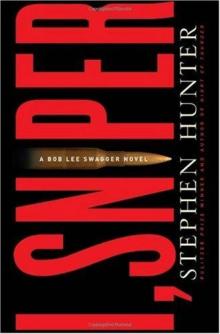 I, Sniper
I, Sniper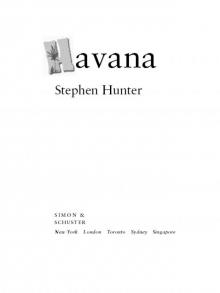 Havana
Havana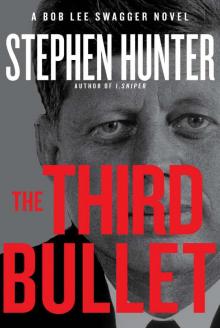 The Third Bullet
The Third Bullet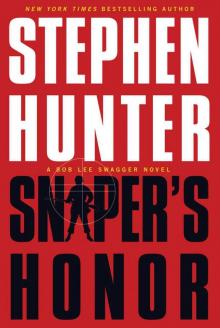 Sniper's Honor: A Bob Lee Swagger Novel
Sniper's Honor: A Bob Lee Swagger Novel Dirty White Boys
Dirty White Boys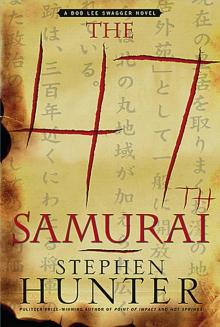 The 47th Samurai
The 47th Samurai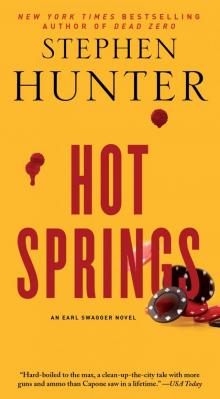 Hot Springs
Hot Springs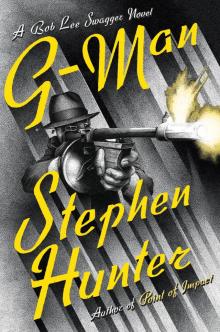 G-Man
G-Man Black Light
Black Light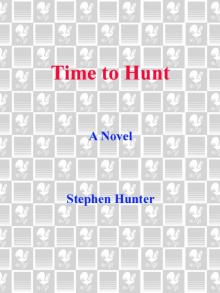 Time to Hunt
Time to Hunt The Day Before Midnight
The Day Before Midnight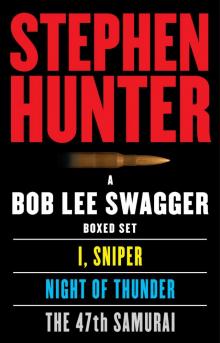 A Bob Lee Swagger Boxed Set
A Bob Lee Swagger Boxed Set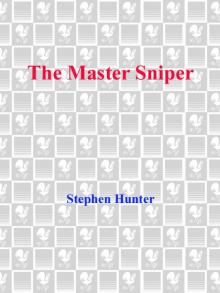 The Master Sniper
The Master Sniper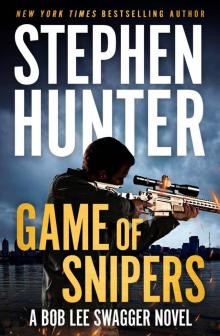 Game of Snipers
Game of Snipers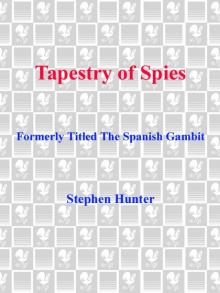 Tapestry of Spies
Tapestry of Spies Citadel
Citadel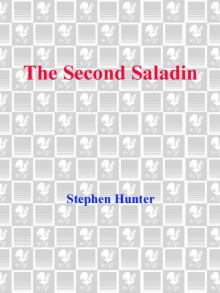 The Second Saladin
The Second Saladin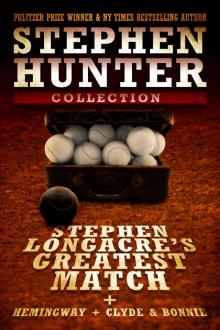 Stephen Longacre's Greatest Match
Stephen Longacre's Greatest Match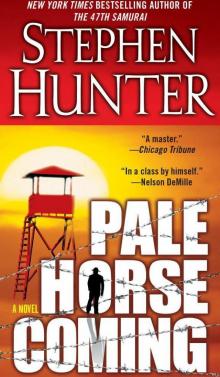 Pale Horse Coming
Pale Horse Coming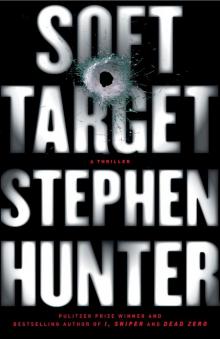 Soft Target
Soft Target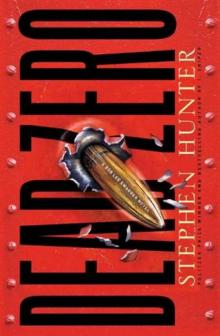 Dead Zero
Dead Zero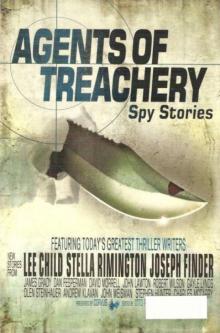 Casey at the Bat
Casey at the Bat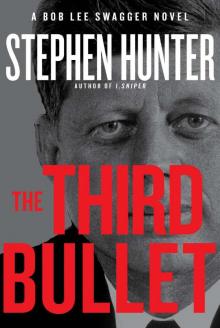 The Third Bullet bls-8
The Third Bullet bls-8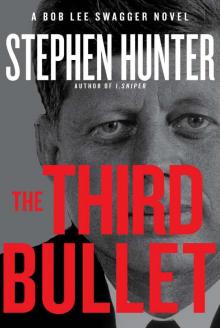 The Third Bullet: A Bob Lee Swagger Novel
The Third Bullet: A Bob Lee Swagger Novel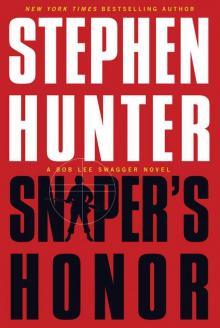 Sniper's Honor
Sniper's Honor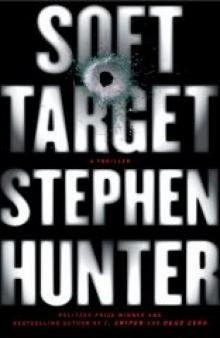 Soft target rc-1
Soft target rc-1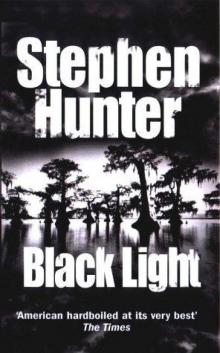 Black Light bls-2
Black Light bls-2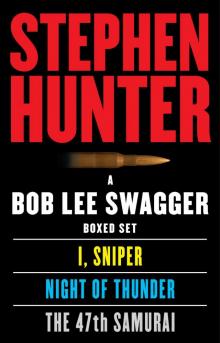 A Bob Lee Swagger eBook Boxed Set: I, Sniper, Night of Thunder, 47th Samurai
A Bob Lee Swagger eBook Boxed Set: I, Sniper, Night of Thunder, 47th Samurai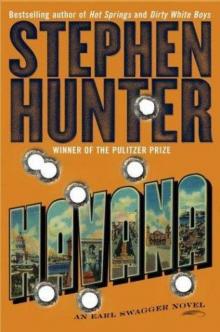 Havana es-3
Havana es-3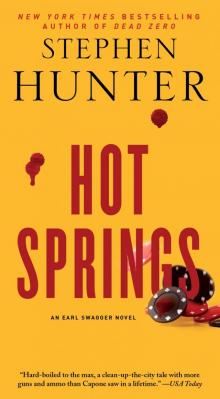 Hot Springs (Earl Swagger)
Hot Springs (Earl Swagger)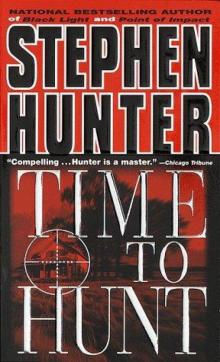 Time to Hunt bls-1
Time to Hunt bls-1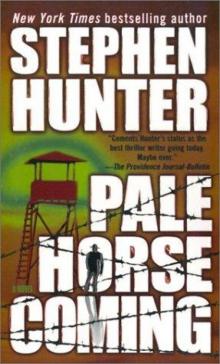 Pale Horse Coming es-2
Pale Horse Coming es-2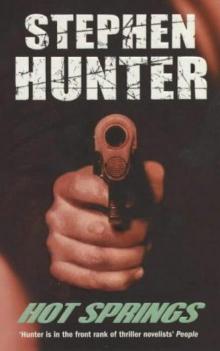 Hot Springs es-1
Hot Springs es-1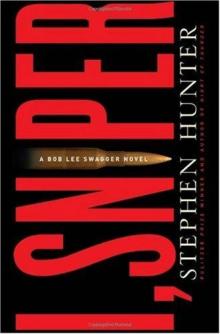 I, Sniper: A Bob Lee Swagger Novel
I, Sniper: A Bob Lee Swagger Novel